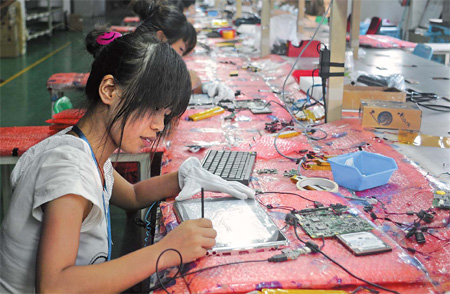-
News >Regional
Copy-making vs profit-making
2010-07-26 09:03Workers are busy with iPad lookalikes on the assembly line in Shenzhen Great Long Brother Industrial Company. Company leaders say the future of electronics is not in copycat work, but in original and innovative products. Duan Yan / China Daily
Lining up to buy a new gadget is nothing new for an Apple fan, but the new hot iPads and iPhones are ringing in a new level of Apple hysteria. On Friday, the stores that sell Apple products in Hong Kong sold out of all their iPads within hours of the first day of their launch. Some stores sold out within 30 minutes.
In Shenzhen, a city in southern China adjacent to Hong Kong, the iPad's hot popularity was defined by the speed in which low quality knockoff products were manufactured to copycat the iPad. Only 60 days after Apple CEO Steve Jobs introduced the iPad in January, small electronic firms in Shenzhen were developing and producing iPad lookalikes.
But even though mobile phones, mp3 players, GPSs and computers that copy the looks and features of branded goods have flooded the consumer electronics market in China, the iPad clones are slower coming into the market.
Manufacturers in Shenzhen have realized that it is becoming more difficult to cash in on iPad fever no matter how fast they are copying it, when the only thing left for them to copy is the looks of the original gadget. And with rising labor costs and a shrinking demand for cheap low-end products, the space for them to make money has become limited.
Many companies lost the battle of netbook PCs last year, and they've discovered that lowering the cost of production is a mission impossible when all the major parts are purchased from other companies.
On the fourth floor of an outdated building in Shenzhen, tablet PC maker Wu Xiaolong brought out a 10.2-inch touch screen PC and photocopy of a patent license. He claims that Apple's iPad stole the design of his product called the P88. Wu has drawn the attention of many reporters from around the world, wanting to talk to him about his claims. He is not planning to sue Apple at the moment, since the iPad is not yet selling on the mainland, he said.
Although reporters flocked to Wu's company, Shenzhen Great Long Brother Industrial Co., Ltd, the four assembly lines of his company are not moving very fast. Wu had learned his lesson: business is not as profitable as it once was. Adjacent to Wu's office, two assembly lines in the production room are empty. The third one is working on products for other companies. And only one line is working on the touch screen PC, with a dozen workers assembling computer parts for the P88.
Wu Xiaolong's P88 is priced at nearly 4,000 yuan, a higher price than Apple's iPad. "Designing and developing a new product is expensive and risky. If the engineers can't come up with a solution for my new product, I will lose money, " Wu Xiaolong said.
Last year, Wu's netbook business was bleak when the market was flooded with low quality netbooks. So this time, Wu is more cautious. Even though iPad global sales eventually hit three million, Wu still hasn't started massive production of his P88 - not before he receives a large order.
Wu said his factory is capable of producing 1,000 tablet PCs each day. With no retail business of his own, most of the orders come from foreign countries.
Wu didn't want to say how many of his tablet PCs have been produced or sold. "It's a business secret," he said.
Although Wu Xiaolong insisted that his product is not a knockoff of the iPad, other companies in Shenzhen are willing to admit they are iPad followers. Wu Yebin, operating director of Teso Computer Technology Company, claims to have developed the first copycat iPad within 60 days of Apple's launch.
"The key to making money for us is the speed. Those companies need to get into the market before iPad comes into China," said Wu Yebin, who has no family relations with Wu Xiaolong.
"Right now, no major computer companies have started pushing for tablet PCs yet," Wu Yebin said. "And the price battle hasn't started yet."
Related News:


